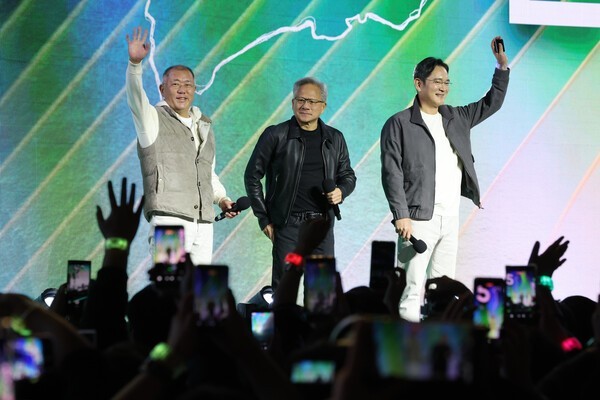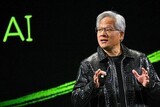Jensen Huang: “Demand for Blackwell is Explosive”
AI Semiconductor Supremacy Intensifies as Memory Supply Chain Battle Begins
NVIDIA has officially announced that it received next-generation high-bandwidth memory (HBM4) samples directly from Samsung Electronics and SK hynix.
At an event hosted by TSMC in Taipei on November 8, NVIDIA CEO Jensen Huang said, “SK hynix, Samsung, and Micron are all expanding their production capacity to support NVIDIA’s AI semiconductor ecosystem,” adding that “we have received state-of-the-art memory samples from all three companies.”
He emphasized, “The AI market is growing faster than expected, and demand for the Blackwell architecture is extremely strong.”

Exploding Blackwell Demand: “Even TSMC’s Wafers Are in Short Supply”
Huang added, “It’s not easy to secure TSMC’s production capacity—wafer demand is skyrocketing.”
NVIDIA is expanding beyond graphics processing units (GPUs) into central processing units (CPUs) and network switches, positioning itself across the full spectrum of AI chips.
TSMC’s CEO also commented, “Jensen Huang has requested additional wafer supply, but the exact volume is confidential,” adding, “NVIDIA’s success is closely tied to TSMC’s advanced process technology.”
Currently valued at over $5 trillion, NVIDIA has become the world’s first semiconductor company to reach that milestone. Huang, dubbed “the $5 trillion man,” said, “The acceleration of the AI computing era has just begun,” emphasizing that “innovation in the memory supply chain will define competitiveness in the AI industry.”
Korean Semiconductor Giants Emerge as Key Pillars of NVIDIA’s Supply Chain
Both Samsung Electronics and SK hynix now stand at the heart of NVIDIA’s AI chip supply chain.
SK hynix announced that all of its HBM3E production for this year has been sold out, with “next year’s output already fully booked.” The company plans to “significantly expand its facilities to prepare for the AI supercycle.”
Samsung Electronics is reportedly conducting sample tests for HBM4 targeting NVIDIA’s next-generation Blackwell GPU.
HBM4 dramatically improves power efficiency and bandwidth compared to previous generations, enabling breakthroughs in AI training speed and data throughput. Both companies are developing ultra-high-speed memory stacks exceeding 12 layers, which NVIDIA will use to design its next-generation AI data center chips.
The Memory War Before the “AI Supercycle”
Experts are calling this announcement “the starting signal of the AI semiconductor supercycle.”
NVIDIA’s Blackwell platform delivers more than twice the performance of the previous Hopper generation, driving an explosive surge in memory demand.
With potential GPU shipments constrained by limited memory supply, Huang’s direct acknowledgment of securing samples from Samsung and SK hynix reflects a clear intent to stabilize the supply chain.
An industry insider remarked, “The HBM market has now become the main stage of the semiconductor industry,” adding, “As Korean chipmakers’ technology and production power align with NVIDIA’s AI vision, the global competition map is being completely reshaped.”
By Ju-baek Shinㅣjbshin@kmjournal.net
- Google Unveils New AI Chip “Ironwood,” Challenging NVIDIA’s Dominance
- Jensen Huang: “In the AI race, China will be the ultimate winner”… Criticizes U.S. export ban
- “The Night of AI Companions”: Jensen Huang, Jay Y. Lee, and Euisun Chung Toast a Global AI Alliance Over Fried Chicken and Beer
- NVIDIA’s $2.8 Billion Bet on Elon Musk’s xAI: The Hidden Strategy Behind Its GPU Empire
- NVIDIA Opens AI Avatar Source Code, Shaking Up Gaming and Metaverse Markets
- NVIDIA Bets $100 Billion on OpenAI: The Dawn of an AI Power Shift
- Samsung’s “Tri-Fold” Phone Arrives Dec. 5... A Bold Bid to Rewrite the Foldable Playbook
- [Tech Column] Is the AI Boom a Bubble in the Making? Michael Burry Targets GPU Depreciation and a $5 Trillion Bet
- NVIDIA’s Jensen Huang Rejects AI Bubble Concerns as a 500 Billion Dollar Order Book Shows the Company’s Lead is Real
- Nvidia Declares the Dawn of an “AI Virtuous Cycle” as It Delivers Record-Shattering Q3 Earnings

![[동학] 카카오톡 친구탭, 결국 12월 롤백… “격자형 피드는 선택 옵션으로”](https://cdn.kmjournal.net/news/thumbnail/custom/20251126/5517_10550_1119_1763853080_120.jpg)


![[테크 칼럼] 제미나이3, GPT-5.1을 넘다…AI는 이제 ‘일을 대신하는 시대’로 간다](https://cdn.kmjournal.net/news/thumbnail/custom/20251126/5457_10454_4847_1763621329_120.jpg)



![[낭만 테크 시대] AI 대항해 시대](https://cdn.kmjournal.net/news/thumbnail/custom/20251126/5603_10714_4334_1764121414_160.jpg)

